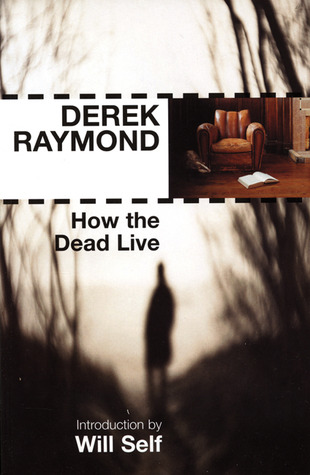
Derek Raymond’s Factory series has the grim allure of a corpse. No matter how many times I turn the final page of one of these books, eager to escape the blight and despair of England’s criminal underworld in the 1980s, I inevitably find myself returning to Raymond’s world, communicated to us through the eyes of his nameless narrator, a veteran policeman without honour in London’s Department of Unexplained Deaths. These novels are, ostensibly, detective stories, but they barely gesture at the conventions of the genre, and in fact delight in leaving many of them unfulfilled. What, then, explains their mysterious power over readers? Succinctly, it must be this: that we intuit, however dimly, that the world we inhabit in our work-a-day lives is but the sanitized version of the real thing, and that only the criminals and those people we charge with apprehending them see the ugly side we deliberately conceal from ourselves.
How The Dead Live is the first of the Factory series novels to take place outside of London. Our nameless narrator is called to investigate the disappearance of a woman of some prominence in a small English town, and the suspiciously anemic investigation performed by her local police department. There, in a nutshell, is the narrative scaffolding, and no doubt an Agatha Christie or Arthur Conan Doyle could wring immense suspense from these basic facts, but Raymond wastes no time in plunging us not into suspense but despair. We are immediately overwhelmed by memories of the dead: police funerals past and present, memories conjured of colleagues killed in the line of duty; a daughter, murdered by her own mother, now in an insane asylum; and the war dead, the best of England killed before their time. The author’s trademark insomnia, mentioned but seldom explained in earlier novels, is given some explanation here:
The other day, having been on inquiry till three, I got up, unable to sleep, at twenty to five in the morning and went to the bathroom; in its wrinkled mirror I saw an anxious, unshaved man. Even naked, without my worn, boring clothes, I was still a low-ranking detective, nothing at all to write home about. Yet what did the dead look like at the front? Any different?
I understood that we all were, and are, part of a most ancient history; it is only meaningless to us because we are nothing but some of the threads. This frail, threadbare picture is all that’s left of us now; its strength was proud but badly led and went down – the most fertile field of all was the worst tilled.
His father, we will later learn, was a veteran of that same conflict, and this sense of being oppressed by history seems characteristic not only of our protagonist but of England in the 1980s, limping into an uncertain future, its glories seemingly confined to a halcyon past.
Our church, my parents’ burial place, is for sale and shored up with baulks of timber, and on my visits I sense the dead waiting in the tall brambles behind the graves. Later I dream of them: they point greyly at me in the pitiless rain, begging me to act for them. Since I cannot they turn hopelessly away again into the hedge, shrunken inside rotten army waterproofs.
And how will we describe our own loss and pain to others, once we have passed to join a dead father by a dead fire in the darkness of a country that has gone?
These paragraphs belong in a serious, elegiac lament for a lost nation, and that, in truth, is what Raymond has written – not a detective fiction at all, but nonetheless an investigation into a death. But as his plot unfolds, and his larger quarry comes into view at last, we will come to understand the dead in question are not the physical dead, beyond all aid, but the living dead, the spiritual dead, the bereaved who have to find a way to move forward in their loss. At a much later stage of the novel, at his most Nietzschean, our narrator-detective gives us this sad description of a hopeless youth caught up in more trouble than he bargained for:
I was sorry for him now. I felt that we were all of us, without exception, filled with errors and that we knew it, yet had to live through them. It would have been better to be stupid, perhaps even mad. It’s the capacity of knowing that’s the real agony of existence; maybe we would all of us be more honest without knowledge.
If there’s any truth in this pronouncement, there’s little comfort in it, but Raymond isn’t a comforting writer and his books don’t make for edifying reading.
More than the two preceding novels in the series, How The Dead Live is a lament for a lost England, and for the fallen state of its once-proud citizens, descended of nobler men with higher callings, and finding themselves now adrift in a world where they are “unneeded and abandoned.” How do the dead live? As ghosts among the ruins.